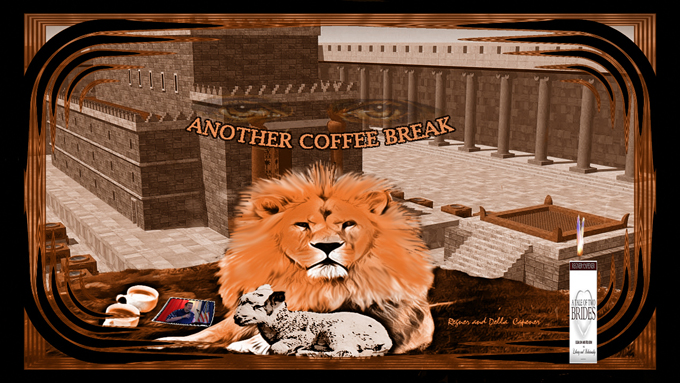
ANOTHER COFFEE BREAK: SUPERNATURAL MATURITY, Part 15
August 26, 2022
OK. We've spent the last three weeks on what it means to be the
salt of the earth. Now it’s time to get on with what it means to be the light
of the world. Once again, here’s how it reads in the KJV:
Matthew
5:13-16: Ye are the salt of the earth: but if the salt have lost his savour, wherewith shall it be salted? it is thenceforth
good for nothing, but to be cast out, and to be trodden under foot of men.
Ye are the light of the world. A city that is set on an hill
cannot be hid. Neither do men light a candle, and put it under a bushel, but on
a candlestick; and it giveth light unto all that are
in the house. Let your light so shine before men, that they may see your
good works, and glorify your Father which is in heaven.
Since
we’ve pretty much covered the first part of this statement, let’s move on to
the amplified and re-translated portion of this passage:
[When I said, “Light be,” that was the light that brought this
world into being. I AM that light.] (Because you are in me, and I AM in you,
you are — likewise — the light of this world. That is a light one cannot hide.
[As representatives of the New Jerusalem] you are like that City
which is elevated on a high hill or mountain and cannot be hidden from view.
(You have been made and destined to be visible to this world.) (Matthew 5:14, RAC
Translation & Amplification)
No one lights a candle, and then hides it under some kind of
covering or utensil. Rather, they put the candle on some kind of lampstand or decorative piece in order to elevate it so as
to give light to the whole room.
Let that light (My light) which is in you, therefore, radiate
brilliantly in front of all men and women so that the value of your
relationship with and in Me — manifested in the works, the signs and wonders —
is demonstrated. That, in turn, will cause Father in Heaven to receive glory
and honor and praise!(Matthew
5:15-16, RAC Translation and Amplification)
Consider,
now, how John described Jesus and how His appearance impacted society:
John
1:5, KJV: And the light shineth in darkness; and
the darkness comprehended it not.
But
look at how the Greek text really puts it:
And the light appeared in the midst of the darkness, exposing
everything previously obscured to view; and the darkness was incapable of
seizing, possessing and overwhelming it. (The darkness couldn’t even understand
the nature, character or makeup of that light). (John 1:5, RAC
Translation and Amplification)
Consider
for a moment, the inability of physical darkness to deal with even the
slightest amount of light. Step into a closet, close the door, and unless the
top, sides and bottom of the door have rubber seals to absolutely block out any
incoming light, even a slight crack at the bottom or sides will allow you to
see even dimly in the closet. In order to illustrate what we are talking about
with light and darkness, let me share a story with you. This is a bit long, and
it gets into a lot of areas, but it highlights precisely where we are going
with this discussion on the significance of our being the light of the world,
and the inability of the natural world to understand and comprehend the
dimension in which we live.
"Let me explain the problem science has with
religion." The atheist professor of philosophy pauses before his class and
then asks one of his new students to stand.
'You're a Christian, aren't you, son?'
'Yes sir,' the student says.
'So you believe in God?'
'Absolutely '
'Is God good?'
'Sure! God's good.'
'Is God all-powerful? Can God do anything?'
'Yes'
'Are you good or evil?'
'The Bible says I'm evil.'
The professor grins knowingly. 'Aha! The Bible! He considers for
a moment. 'Here's one for you. Let's say there's a sick person over here and
you can cure him. You can do it. Would you help him? Would you try?'
'Yes sir, I would.'
'So you're good...!'
'I wouldn't say that.'
'But why not say that? You'd help a sick and maimed person if
you could. Most of us would if we could. But God doesn't.'
The student does not answer, so the professor continues. 'He
doesn't, does He? My brother was a Christian who died of cancer, even though he
prayed to Jesus to heal him. How is this Jesus good? Can you answer that one?'
The student remains silent. 'No, you can't, can you?' the
professor says. He takes a sip of water from a glass on his desk to give the
student time to relax.
'Let's start again, young fella. Is
God good?'
'Er..yes,' the student says.
'Is Satan good?'
The student doesn't hesitate on this one.. 'No.'
'Then where does Satan come from?'
The student falters. 'From God.'
'That's right. God made Satan, didn't he? Tell me, son. Is there
evil in this world?'
'Yes, sir.'
'Evil's everywhere, isn't it? And God did make everything,
correct?'
'Yes'
'So who created evil?' The professor continued, 'If God created
everything, then God created evil, since evil exists, and according to the
principle that our works define who we are, then God is evil.
Again, the student has no answer.
'Is there sickness? Immorality? Hatred? Ugliness? All these
terrible things, do they exist in this world?'
The student squirms on his feet. 'Yes.'
'So who created them ?'
The student does not answer again, so the professor repeats his
question. 'Who created them?' There is still no answer. Suddenly the lecturer
breaks away to pace in front of the classroom. The class is mesmerized.
'Tell me,' he continues onto another student. 'Do you believe in
Jesus Christ, son?'
The student's voice betrays him and cracks. 'Yes, professor, I
do.'
The old man stops pacing. 'Science says you have five senses you
use to identify and observe the world around you. Have you ever seen Jesus?'
'No sir. I've never seen Him.'
'Then tell us if you've ever heard your Jesus?'
'No, sir, I have not.'
'Have you ever felt your Jesus, tasted your Jesus or smelt your
Jesus? Have you ever had any sensory perception of Jesus Christ, or God for
that matter?'
'No, sir, I'm afraid I haven't.'
'Yet you still believe in him?'
'Yes'
'According to the rules of empirical, testable, demonstrable
protocol, science says your God doesn't exist. What do you say to that, son?'
'Nothing,' the student replies. 'I only have my faith.'
'Yes, faith,' the professor repeats. 'And that is the problem
science has with God. There is no evidence, only faith.'
The student stands quietly for a moment, before asking a
question of His own. 'Professor, is there such thing as heat? '
' Yes.’
'And is there such a thing as cold?'
'Yes, son, there's cold too.'
'No sir, there isn't.'
The professor turns to face the student, obviously interested.
The room suddenly becomes very quiet.
The student begins to explain.
'You can have lots of heat, even more heat, super-heat,
mega-heat, unlimited heat, white heat, a little heat or no heat, but we don't
have anything called 'cold'. We can get down to 458 degrees below zero, which
is no heat, but we can't go any further after that. There is no such thing as
cold; otherwise we would be able to go colder than the lowest -458 degrees. Every body or object is susceptible to study when it has or
transmits energy, and heat is what makes a body or matter have or transmit
energy. Absolute zero (-458 F) is the total absence of heat. You see, sir, cold
is only a word we use to describe the absence of heat. We cannot measure cold.
Heat we can measure in thermal units because heat is energy. Cold is not the
opposite of heat, sir, just the absence of it.'
Silence across the room. A pen drops somewhere in the classroom,
sounding like a hammer.
'What about darkness, professor. Is there such a thing as
darkness?'
'Yes,' the professor replies without hesitation. 'What is night
if it isn't darkness?'
'You're wrong again, sir. Darkness is not something; it is the
absence of something. You can have low light, normal light, bright light,
flashing light, but if you have no light constantly you have nothing and it's
called darkness, isn't it? That's the meaning we use to define the word. In
reality, darkness isn't. If it were, you would be able to make darkness darker,
wouldn't you?
'
The professor begins to smile at the student in front of him.
This will be a good semester.
I
know you're looking at me cross-eyed, wondering where this is going, but bear
with me. We'll finish the story and wrap this up next week.
I remind those of you
in need of ministry that our Healing Prayer Call takes place on Mondays at 7:00
PM Eastern (4:00 PM Pacific). Once again, the number to call for healing is
(805) 399-1000. Then enter the access code: 124763#.
At the same time, in
case you are missing out on real fellowship in an environment of Ekklesia, our Sunday worship gatherings are available by
conference call – usually at about 10:45AM Pacific. That conference number is
(559) 726-1300, and the access code is 308640#. We hope to make these
gatherings available by Skype or Talk Fusion before long.
Blessings
on you!

Regner
A. Capener
CAPENER MINISTRIES
RIVER
WORSHIP CENTER
Sunnyside, Washington 98944
Email
Contact: Admin@RiverWorshipCenter.org
All
Coffee Break articles are copyright by Regner A. Capener, but authorization for
reprinting, reposting, copying or re-use, in whole or in part, is granted
–provided proper attribution and this notice are included intact. Older Coffee
Break archives are available at http://www.RegnersMorningCoffee.com. Coffee Break
articles are normally published weekly.
If you would like to have these articles arrive each morning in your email,
please send a blank email to: Subscribe@AnotherCoffeeBreak.com.To remove yourself
from the mailing list, please send a blank email to Unsubscribe@AnotherCoffeeBreak.com.
CAPENER
MINISTRIES is a tax-exempt church ministry. Should
you desire to participate and covenant with us as partners in this ministry,
please contact us at either of the above email or physical addresses, or
visit: http://www.RiverWorshipCenter.org.
